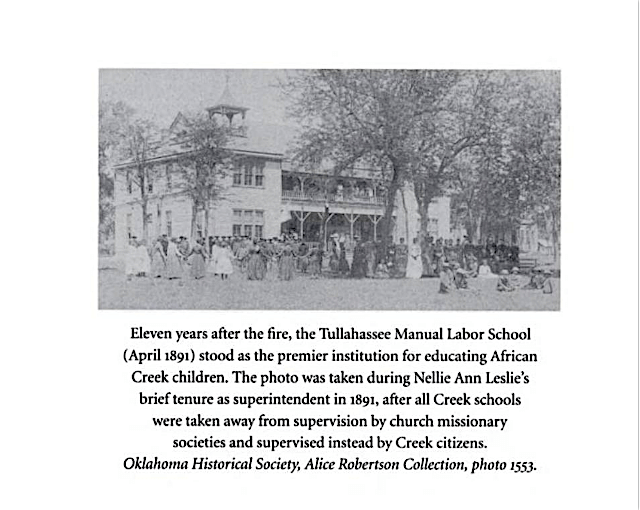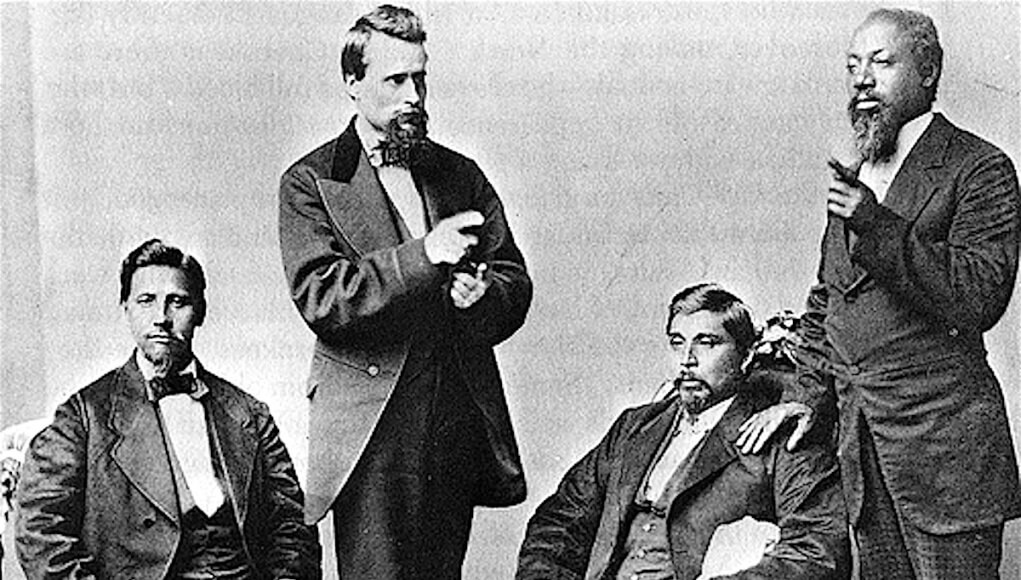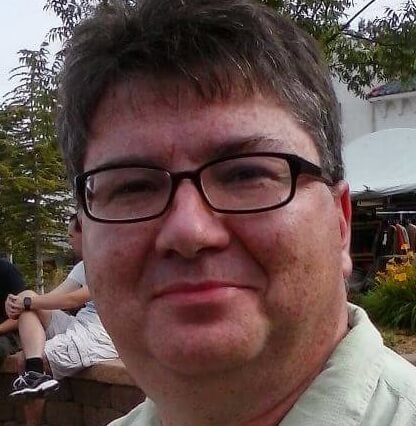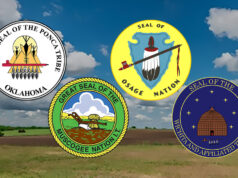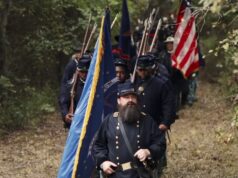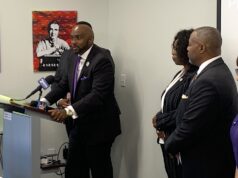Five years after petitioning the Bureau of Indian Affairs for status as a separate tribe, members of the Muscogee Creek Indian Freedmen Band remain in limbo.
While these descendants of slave Creek Indians held before the Civil War are preparing to observe the 150th anniversary of the treaty that made their ancestors Creek Nation citizens, they have been a band without a tribe for the last 37 years.
Jeffrey D. Kennedy, vice president of the Muscogee Creek Indian Freedmen Band, said his people have been without tribal status since the Muscogee (Creek) Nation adopted a new tribal constitution in 1979 that disenrolled freedman descendants.
“They basically voted us out,” he said.
‘Form your own tribe’
Muscogee Creek freedmen descendants founded the organization Kennedy now helps lead in 2008, following a discussion about the Cherokee Nation’s controversial decision to disenroll Cherokee freedmen. Descendants of slaves owned by Cherokees were removed from that tribe’s rolls in 2007.
Cherokee freedmen descendants took to the courts and filed suit regain their citizenship. Regarding that suit, U.S. District Judge Thomas F. Hogan said in 2014 he would soon issue a ruling on the case, but he has not taken further action.
Kennedy said his group was formed after someone suggested the Creek freedmen take a different approach.
“They said, ‘Hey, why don’t you go form your own tribe?’” Kennedy said.
The group considered pursuing legal action to regain citizenship in the Muscogee (Creek) Nation, but Kennedy said he opposed the idea because it would leave others in charge of his people’s destiny.
Kennedy said he would not want to give the large tribe the chance to “hold another meeting and kick us out again.”
So, in 2011, the Muscogee Creek Indian Freedmen Band filed a petition with the Bureau of Indian Affairs’ Office of Federal Acknowledgement to be recognized as a separate tribe. If approved, the group wouldn’t be the only part of the historical Creek Nation to be recognized separately.
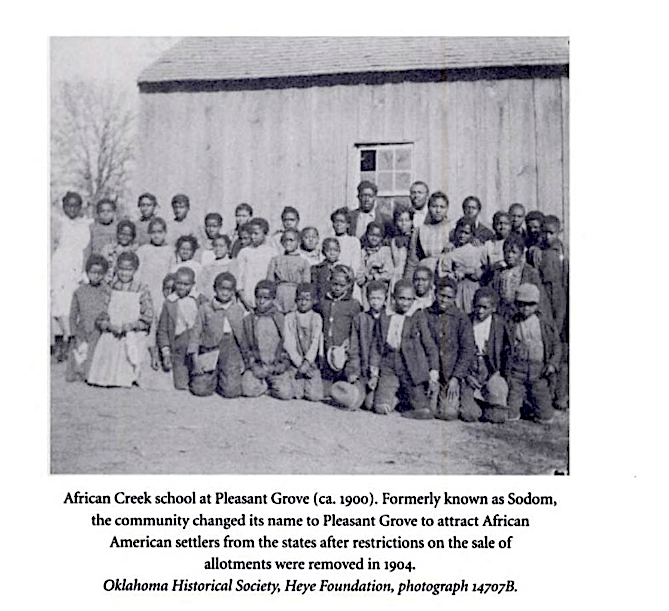
Ignoring the treaty
Eli Grayson, a member of the Muscogee (Creek) Nation Hall of Fame and a longtime advocate for the freedmen, said the issue should not be controversial and that the treaty’s wording is clear.
“It’s written in simple language a 5-year-old could read,” Grayson said. “It’s that it’s being ignored.”
Prior to 1906, the Creek Nation governed an area stretching from Fort Gibson to the western border of Indian Territory, but it was ordered to shut down by an act of the U.S. Congress in preparation for Oklahoma statehood. The tribal government was reorganized after passage of the Oklahoma Indian Welfare Act in 1936, but three communities that had been a part of the pre-statehood Creek Nation opted not to join the new Muscogee (Creek) Nation. Instead, Kialegee, Thlopthlocco and Alabama-Quassarte were recognized as independent tribes.
Treaty of 1866 sesquicentennial commemorative event
June marks the 150th anniversary of the 1866 Treaty with the Creeks, better known as the Reconstruction Treaty. To commemorate the treaty’s signing, the Muscogee Creek Indian Freedmen Band is hosting a two-day event June 24-25 at the Skivin Hilton Hotel in Oklahoma City.
Living-history interpreter Wallace C. Moore will be the event’s keynote speaker. He will portray Cow Tom, a Creek freedman who signed the Reconstruction Treaty and served as a micco, or “town king,” after the Civil War.
Even earlier, the Creek Nation of the 1800s had developed from a confederacy of independent towns. Each town was represented in the two houses of the Creek legislature. Towns were represented in proportion to their population in the lower house, the House of Warriors. The upper house, the House of Kings, had two representatives from each town.
Gail Jackson, lead author of the freedmen group’s petition for federal recognition, said freedmen had representatives in Creek legislature, and one the of the judges on the Creek supreme court was a freedman. Descendants of the freedmen continued to speak the Creek language through the 1940s.
Grayson, an enrolled member of the Muscogee (Creek) Nation with ancestors listed as both citizens by blood and by virtue of being freedmen, said that when the Creeks came to Indian Territory, they brought their identities as members of town along with them on the Trail of Tears. The old towns had been named for the rivers and streams they were located upon. When the freedmen towns were created, they were named for the bodies of water where they were located. The three, Arkansas, Canadian and North Fork, were given representation in the Creek legislature equal to that of the existing towns.
Some freedmen were already members of a town, or joined the town of their former owners, but most joined one of the three Creek towns created for the freedmen.
The here and now
While the federal government has yet to take action on the Muscogee Creek Indian Freedmen Band’s petition, Kennedy, the vice president, said the federal recognition process usually takes five years and starts with a letter.
His group followed up its 2011 letter with more than 8,000 pages of supporting documents going back to 1814. The BIA asked for additional documentation the next year, so Kennedy’s group sent another 23,000 pages of documents — enough to fill seven boxes.
“We’ve done the research and done the due diligence,” Kennedy said.
Grayson agrees that his tribe should never have disenrolled the freedmen; however, he said he believes the effort to obtain federal recognition is the wrong path. Instead, he points to the ongoing lawsuit filed by Cherokee freedmen descendants to regain citizenship in their former tribe.
Grayson also said the freedmen have missed past opportunities. For one, he said, the 1979 action that disenrolled the freedmen should have been protested. For another, descendants of the freedmen towns could have applied for a separate status when the Muscogee (Creek) Nation was reorganized in the 1930s. That’s when the three Creek towns that are now independent tribes petitioned for their recognition.
Kennedy said he is more interested in the here and now, however. He said there’s no doubt who he and the other freedmen descendants are.
“We’re probably some of the most documented people in the nation,” Kennedy said.
On that point, Grayson agrees.
“You can actually document every person on the Creek freedman roll,” he said. “You can’t deny who these people are because they are in every corner of the Creek Nation.”
